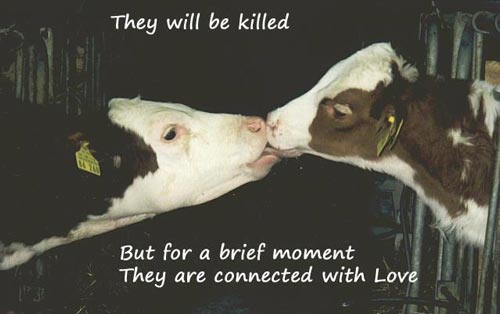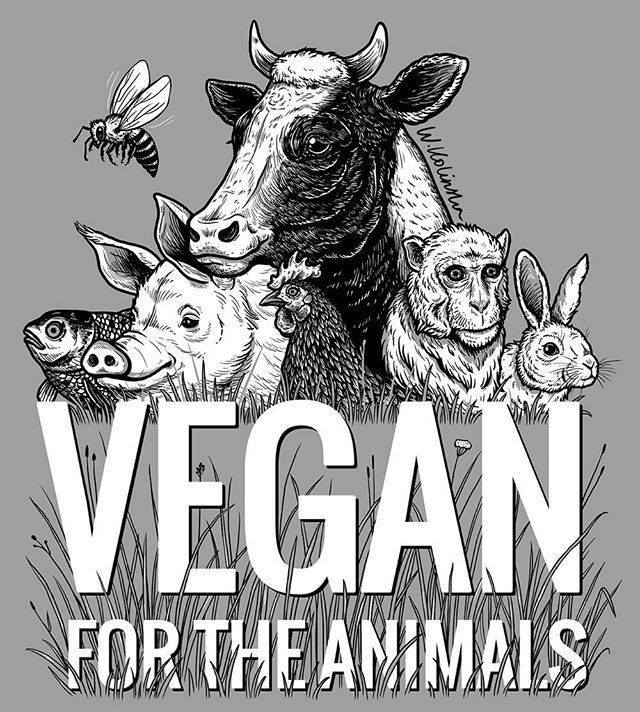Peace Begins on the Plate
Book Review by Charles Patterson

The World Peace Diet: Eating for Spiritual Health and Social Harmony by Will Tuttle, Ph.D. (New York: Lantern Books, 2005). $20 paperback. 318 pages.
The World Peace Diet is a unique contribution to understanding the direct relationship between the food we eat and the vast range of the world’s problems—hunger, poverty, disease, war, terrorism, genocide, environmental degradation, and, of course, the exploitation and slaughter of billions of defenseless animals, which all too many people do not consider a problem at all.
To explain how the ugly reality of the abuse and killing of animals became the centerpiece of our so-called civilization, Dr. Will Tuttle examines the emergence of our herding culture that began roughly 10,000 years ago in the Near East with the enslavement (euphemistically called “domestication”) of sheep and goats, and later cattle, camels, horses, and other animals for food, clothing, transport and labor.
This herding culture introduced a higher level of domination and coercion into human history and eventually led to oppressive hierarchical societies and large-scale warfare never seen before. The enslavement of animals and the intensive animal agriculture that resulted from it injected large doses of ruthlessness, detachment, and socially accepted cruelty into the fabric of our civilization. It also produced assorted ideologies of human supremacy and speciesist attitudes that today define our relationship to animals.
Tuttle examines in detail the horrors of modern industrialized animal agriculture—factory farms, slaughterhouses, hunting and herding sea life, the devastating effects on human health and the environment, and the corporate meat-medical complex behind it all. In a chapter called “The Domination of the Feminine” he describes the “dairy nightmare” and the “four pathways to hell” for calves born to dairy cows. He also writes about the egg industry as another manifestation of our patriarchal herding culture’s domination of the feminine.
Failure to see, confront, and take responsibility for the vast hidden suffering that our food choices require shrivels us up as human beings emotionally, intellectually, and spiritually and keeps our society in a perpetual state of denial and hypocrisy. Keeping ourselves oblivious to what we’re doing when we purchase, prepare, and consume meat, eggs, and dairy products truncates our capacity to think, feel, and care for others.
According to Tuttle, the desensitizing of millions of children and adults to the daily torture of animals plants in them the seeds of violence, poverty, war, genocide, and despair. The cycles of violence that have terrorized and continue to terrorize people are rooted in our meals. Eating animals forces us to act like predators, and we then proceed to see and define ourselves as such. The cruelty we are forced to participate in as children turns us into lifetime perpetrators of cruelty. How can we be peaceful and compassionate people while eating the flesh of abused animals?
Growing up, none of us freely chose to eat animals. Our family and culture imposed it on us. Well-meaning parents, grandparents, and others force us to eat the flesh and secretions of animals long before we have any choice in the matter. By the time we find out that the meat on our plate is the flesh of a murdered animal, it all seems natural and normal. By then our daily meals are already rituals of denial and repressed guilt that dull our innate compassion and our propensity for justice.
The conspiracy of silence about the truth of our meals is so pervasive that there is a strong societal taboo against knowing where our food comes from. Exploiting and killing animals is such an accepted part of our way of life that it is unmentionable in public and is virtually ignored in discussions and debates about social problems and public policy. It never seems to occur to those our society considers its leaders that the best way to curb violence is to get people to stop eating violence.
Late in the book the author tells the story of his own journey to veganism. While living in Concord, Massachusetts, for the first 22 years of his life, Tuttle, like most Americans, ate large quantities of animal flesh, eggs, and dairy products. However, during that time he also encountered seeds of inspiration that sprouted later: the literary revolution of the 1840s and ‘50s, based in Concord, that sprang from the lives and writings of American transcendentalists like Ralph Waldo Emerson, Henry David Thoreau, Nathaniel Hawthorne, and Louisa May Alcott.
Tuttle points out that they were the first major American thinkers to question the meaning of food and establish a philosophical foundation for a more compassionate attitude toward animals. Thoreau thought the destiny of the human race should be “to leave off eating animals as surely as the savage tribes have left off eating each other,” and Louisa May Alcott wrote, “Vegetable diet and sweet repose. Animal food and nightmare… Without flesh diet there could be no blood-shedding war.”
Tuttle’s commitment and dedication to his vegan, nonviolent worldview suffuses every page of this profoundly insightful and important book. The World Peace Diet is sure to be a catalyst and powerful tool in the evolution of human consciousness, from our present herder mindset—based on might-makes-right and the exploitation of others—to a more humane attitude toward the earth and all its inhabitants.
Charles Patterson is the author of Eternal Treblinka: Our Treatment of Animals and the Holocaust (Lantern Books), now translated into German, Hebrew, Italian, Polish, Czech, and Croatian, with Spanish and Portuguese translations on the way.
Carmina joined the Facebook group "The World Peace Diet." Add your name!
Stopping factory farming
Comment: June 2011
Increasingly, the public, along with animal welfare and rights organizations, are demanding accountability from corporate factory farms. There is no regard for animal welfare; the motivation is solely profit-driven. And at what cost does this come? The impacts are devastating. Animal cruelty, environmental degradation, food safety, antibiotic use, and hazardous working conditions are some of the ills of big agriculture. The film, Meatrix, and Jonathan Safran-Foer’s book, The Truth About Factory Farming made hidden truths public.
In 2008, the New Jersey Supreme Court ruled factory farm practices are not humane.
Trenton, New Jersey July 31, 2008 (ENS) - Factory farming practices cannot be considered humane simply because they are widely used, the New Jersey Supreme Court ruled Wednesday, setting a legal precedent for further actions to end the worst abuses on factory farms throughout the United States.
In a
unanimous decision, the court struck down the New Jersey Department of
Agriculture's regulations exempting all routine husbandry practices as "humane,"
and ordered the agency to readdress many of the state-mandated standards for the
treatment of farm animals.

In 2009, in an attempt to expand animal cruelty criminal laws to cover the treatment of livestock, Seattle-based Northwest Animal Rights Network filed a lawsuit arguing that existing laws give industry undue control over how animals are housed and slaughtered. At a minimum, the aim is “to limit the manner in which meat and dairy producers treat their livestock,” said Adam Karp, an attorney representing the group. Under state law, animal cruelty can be charged as a felony. But the law exempts livestock handlers from prosecution so long as their actions are in line with "customary animal husbandry practices."
Recently, PETA announced it is suing the California Department of Food and Agriculture (CDFA) and the California Milk Advisory Board for making false and misleading advertising claims in their “happy cows” ads. Dairy cows can be seen chatting in lush green fields, whereas the reality is quite the opposite for these poor creatures. PETA filed a public-records request for all documents to substantiate the claims made in the “happy cows” ads, but the CDFA failed to produce any documentation supporting the commercials.
These are but a few cases in which the law is being utilized to bring accountability and reform to an industry characterized by cruelty and greed.
March 20, 2012 Taking meat off the menu - a powerful and compelling speech by Philip Wollen, Australian philanthropist, Environmentalist, and animal rights activist
I heard the screams of my father dying of cancer, and I realized that I knew those screams. I heard them in slaughterhouses, dog meat markets, cattle ships, from a dying mother of a kitten calling for her baby while a whaling harpoon punched through her head explodes in her brain. Their screams are my father's screams. I realized that when we suffer, we are all equal. The cries of suffering are the same in all animal species and in all languages.
Farm Animals are Sentient Beings pdf
Please visit our Ethics page for further information and resources. The best choice you can make to stop the suffering and death of animals raised for food is to adopt a plant-based diet.
Canadians Killed More Than 750 Million Animals For Food in 2015
April 28, 2016
Slaughter reports from Agriculture and Agri-Food Canada reveal that we killed at least 750,409,569 land animals for food in 2015.
This is an increase from previous years, mostly due to an increase in the number of chickens killed. In recent years, we’ve killed roughly 620 million chickens each year. This number jumped to 640 million in 2014 and 660 million in 2015.
Here are the total number of animals slaughtered in Canada in 2015 by species:
- Meat chickens: 660,959,987

- Egg-layer hens: 36,526,578
- Turkeys: 21,477,602
- Ducks and geese: 5,989,919
- Pigs: 21,186,243
- Adult cows: 2,672,806
- Calves: 225,530
- Sheep and lambs: 557,851
- Goats: 61,048
- Bison: 14,186
- Rabbits: 669,873
- Horses: 67,946
These numbers don’t include:
- More than 90 million tonnes of fin fishes like salmon (they are only counted by weight) killed in Canadian fish farms.
- Tens of millions of male chicks killed at birth in the egg industry.
- Millions of animals who died of disease or injuries on farms or en route to slaughter.
- Thousands of deer, elk, and wild boars killed in Canadian slaughterhouses for which 2015 data is not available.
If you think that being vegan is difficult, imagine how difficult it is for animals that you are not vegan. Gary L. Francione
Comment: Industrial farming is responsible for more pain & misery than all the wars of history put together. Tens of billions of sentient beings, each with complex & emotions, live & die on a production line. The march of human progress is strewn with dead animals.
Canada Slaughtered 834 Million Animals in 2019
May 13, 2020 Animal Justice https://www.animaljustice.ca/blog/canada-slaughtered-834-million-animals-in-2019
The Canadian meat industry is slaughtering more animals for food than ever before, according to government slaughter statistics analyzed by Animal Justice. In 2019, over 833 million land animals were killed at the hands of the meat industry—up drastically from 750 million in 2015.
Up from 819 million in 2018, 800 million in 2017, 771 million in 2016, and 750 million in 2015.
NOTE: This is an incomplete picture as other animals killed by the meat, dairy, and egg industries outside of slaughterhouses are also not accounted for in this analysis, including the millions of animals who die prematurely of illnesses and injuries on farms or during transport, and the millions of animals who are so sick and injured that they are condemned when they arrive at slaughter.
Horses have not been included, nor are rabbits, chicks killed in hatcheries, those who are live exported, and aquatic animals. Statistics for goats have yet to be released.
NB: In 2018, stats show 604,287 rabbits were slaughtered.
Comment: What an abominable portrait of Canadian society. It seems that our humanity has ceased to exist.
2022 CANADA ANIMAL KILL CLOCK https://www.animalclock.org/ca/
More Than 150 Billion Animals Slaughtered Every Year: Animal Kill Counter
There's plenty more on our Factory Farming, Ethics, and Animal Law pages.
It's a message that can no longer be ignored: killing animals is killing the planet.